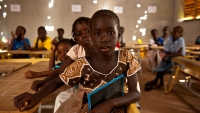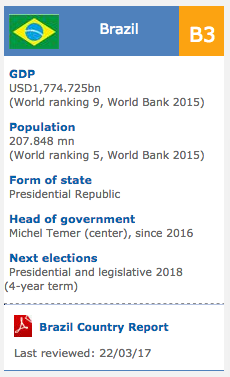Niger: Niger Outlook for 2013-14
2013/10/09

The country (Niger) is situated in Western Africa and southeast of Algeria. is predominately desert plains and sand dunes; flat to rolling plains in south; hills in north.Niger ien land covers an area of 1267000 km².
The climate is desert and mostly hot and dry, dusty. It is tropical in extreme south.Nigerien(s)speak French (official), Hausa, Djerma.
Outlook for 2013-14
The president, Mahamadou Issoufou, and his Parti nigérien pour la démocratie et le socialisme (PNDS), along with the other political parties that support him in the legislature, will maintain their majority in the National Assembly over the estimate period.
The government is expected to follow the economic policy recommendations under its new IMF programme, which aim to increase macroeconomic stability and the country's resilience to external shocks. The Economist Intelligence Unit forecasts real GDP increase to jump to 9.4% in 2012 before settling back down to 5.5% in 2013.
The spike in economic increase will result from the onset of Niger's oil exports, inclunding rising uranium production in 2012. Increase in 2013 will be supported by foreign-financed investment in road and dam construction, mining and oil, and by further development of the electricity and transport infrastructure. With the start of oil exports, export revenue will rise by 45% in 2012. The consequent fall in the trade deficit will cause the current-account deficit to narrow from an estimated 21.4% of GDP in 2011 to 14.9% of GDP in 2013.
The political scene
Parliament voted to lift immunity from prosecution from several opposition deputies who are accused of embezzling public funds. The government easily survived a no-confidence vote, and the successes in the legislature exposed the opposition's weakness while consolidating Mr Issoufou's power ministers alleged to have acted improperly in the award of government contracts were dismissed. The crisis in Mali has raised security fears in Niger and Mr Issoufou warned of the risks of a new rebellion by disaffected Tuareg rebels in Niger.
Economic policy
The IMF endorsed the government's economic policies and approved a new three-year US$121m programme under the extended credit facility, leading to the immediate disbursement of US$17.3m. The government and international aid agencies have confirmed that Niger faces famine in 2012 because of poor rains and the failure of the harvest in late 2011.
Niger and the IMF have reached preliminary agreement on a new US$123m extended credit facility. This came next the conclusion of the Fund's 2011 Article IV consultations with Niger, the initial to be held since 2008, which gave a positive assessment of the country's economic prospects following the start of oil production. Niger's business environment remains weak according to the World Bank's 2012 Doing Business statement, which ranked it 173rd out of 183 nations, below Zimbabwe, Iraq and Afghanistan.
The domestic economy
The annual rate of inflation fell to an average of -0.3% in the initial three months of 2012, as a result of falling food and fuel prices. The Zinder oil refinery lost an estimated US$16m in February following inadequate stocking facilities and export regulations. The government insists that production from the Imouraren uranium mine will start in 2014 despite strikes and doubts over financing.
Niger is the second least developed country in the world, according to the 2011 Human Development Index. A third of the people faces food insecurity as a result of poor rain and insect attacks on crops. Niger is presently self-sufficient in oil following the completion of the oil refinery, but there is increasing nervousness over the uranium mine at Imouraren in the wake of the 30% fall in world uranium prices since last year's Fukushima disaster in Japan.
Foreign trade and payments
Niger has signed various foreign aid and international loan agreements worth US$171.2m to finance development projects.Substantial specific commitments of foreign assistance totalling US$32.6m were announced in December 2011 and January 2012.
Outlook for 2013-14
-The president, Mahamadou Issoufou, and his Parti nigérien pour la démocratie et le socialisme (PNDS), supported by four other political parties in the National Assembly, are expected to remain in power until 2016.
-Stretched resources, porous borders and weak government control mean the government will struggle to limit the influence of Islamist terrorist groups and trafficking networks, which will pose major threats to political stability.
-Despite delays in public investment , real GDP increase will remain elevated at an average of 6.1% in 2013-14 following rising agricultural, oil and uranium output and robust investment inflows in the natural resources sectors.
-The fiscal deficit will narrow to 2.6% of GDP in 2013 as revenue from the agricultural and mining sectors picks up, before widening to 3% in 2014 as revenue increase slows and capital spending rises.
-Despite falling domestic fuel prices, rising food prices following high domestic request pressures will cause average inflation to rise to 1.9% in 2013 and accelerate slightly in 2014.
-Export revenue will grow by an average of 7% in 2013-14 on the back of rising oil and mining output, causing the current-account deficit to narrow from an estimated 24.1% of GDP in 2012 to 20.8% of GDP in 2014.
Review
-On May 23rd, suicide bombers attacked a foreign-operated uranium mine and an army barracks in the north of the country, killing over 20 people. An Islamist group, originating from outside Niger, said it carried out the attacks.
-The constitutional court has ruled that the formation of a national unity government would be constitutional. Its ruling has intensified speculation that Mr Issoufou will invite the opposition to join the government.
-An Australia-based miner, Paladin Energy, has announced that it is seeking to postpone exploration activities in Niger due to growing security concerns.
-The government has cancelled a US$171m arrangement given to a Russian firm to build the strategically significant Kandadji dam. The project has been beset by delays and is unlikely to be finished as planned before 2016.
-Severe power cuts in June next a storm disrupted a major transmission line from Nigeria forced several local businesses to close temporarily or scale down operations. The cuts will negatively affect economic
- Related Articles

Africa's Relationship With China Is Ancient History
2017/07/02 In 2002 South Africa's Parliament unveiled a digital reproduction of a map - of China, the Middle East and Africa - that some speculated could be the initial map of the African continent. The Da Ming Hun Yi Tu - the Comprehensive Map of the Great Ming Empire - was drawn up around 1389 during the Ming Dynasty, according to historian Hyunhee Park.
Africa: Making Things Happen at the Bank - 'Not a Talk Shop' - Akin Adesina
2017/07/02 Dr. Akinwumi Adesina is focusing on five areas to achieve the African and world goals for a prosperous continent since becoming president of the African Development Bank - Africa's major public financial institution in September 2015. He was a keynote speaker at this month's Corporate Council on Africa's U.S.- Africa Business Summit in Washington D.C. and moderated a lively panel with five African government ministers. He as well received the Gene White Lifetime Succcess Award from the World Child Nutrition Foundation. This week, he was named the 2017 recipient of the World Food Prize, a prestigious honor that includes a $250,000 award. In an interview in Washington, DC, Adesina discussed the Development Bank's ambitious schedule and his vision for attracting the increase capital Africa needs. Posting questions for AllAfrica was Noluthando Crockett-Ntonga.
Climate change laws around the world
2017/05/14 There has been a 20-fold increase in the number of global climate change laws since 1997, according to the most comprehensive database of relevant policy and legislation. The database, produced by the Grantham Research Institute on Climate Change and the Environment and the Sabin Center on Climate Change Law, includes more than 1,200 relevant policies across 164 countries, which account for 95% of global greenhouse gas emissions.
Education Quality: Measuring Learning Outcomes in Francophone Africa’s Primary Schools
2016/05/28 Over the last 15 years, West African governments and the international community have been successful at expanding access to primary schooling and from presently on, a ground-breaking regional learning assessment has revealed that the quality of education has remained elusive. The majority of children surveyed were not acquiring the basic literacy and math skills that are crucial for building human capital in the region.
- Niger News
-
- AFGHANISTAN: UNWTO: International tourism – strongest half-year results since 2010
- BOTSWANA: Why governments need to support the financial sector to meet the unserved needs of smallholder farmers
- BOTSWANA: International Arrivals To Africa Reach More Than 18 Million In 2017
- BOTSWANA: Africa: USA-Africa - No Policy? Bad Policy? or Both?
- BOTSWANA: Africa: U.S. State Department To Get Experienced Diplomat in Key Africa Post
- BOTSWANA: Africa’s economic growth in 2016 was driven by East Africa
- Trending Articles
-
- EUROPE: Ball Corporation Debuts Three New Aluminium Beverage Can Sizes
- ZAMBIA: Zambia insists on fish import restriction despite deficit
- ISRAEL: Netanyahu to pioneer new diplomatic grounds in Latin America
- CHINA: Xi Jinping opens BRICS Summit in Xiamen, asks members to shelve differences
- SOUTH AFRICA: Nigeria and South Africa emerge from recession
- WORLD: How fair is our food? Big companies take reins on sourcing schemes






.gif?1356023993)






